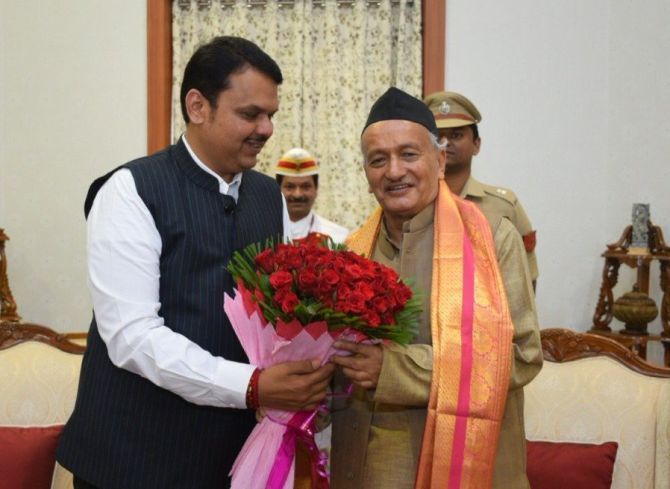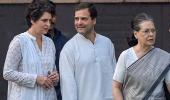'The governor has the discretion to appoint anybody as chief minister.'
'The only condition is the person so appointed must be able to prove his majority on the floor of the House.'

Former Lok Sabha secretary-general and Constitutional expert Subhash C Kashyap explains to Prasanna D Zore/Rediff.com the road ahead in Maharashtra now that Devendra Fadnavis has resigned as chief minister. This interview was conducted minutes before the chief minister quit.
What are the options for the Maharashtra governor now?
The governor can ask the chief minister (Devendra Fadnavis) to continue. When the chief minister resigns, the governor can ask him to continue till alternative arrangements are made.
When does the chief minister have to resign?
As soon as the term of this assembly expires, he should resign (The term of the Maharashtra legislative assembly expires on the midnight of November 8-9). The chief minister can resign on that day or the day before the term of the assembly ends. He should submit his resignation to the governor and the governor can then him continue as a caretaker chief minister till alternative arrangements are made.
While that is technically possible and Constitutionally permissible, I think there is no reason for the governor for not appointing a chief minister so far.
The governor should immediately appoint a regular chief minister and ask him to prove his maturity on the floor of the House.
But not a single party has yet staked a claim before the governor to form the next government in the state. Nobody is yet confident of proving their majority on the floor of the House.
There is no provision in the Constitution for political parties to make a claim (to form the government). The Constitution provides that the chief minister shall be appointed by the governor.
It is the governor's duty to exercise his discretion and appoint someone as the chief minister and see whether he commands majority or not on the floor of the House and not on the lawns of the Raj Bhavan or any other place.
Who should the governor call and appoint as chief minister?
The leader of the largest single party can be called first (to form a government and prove his majority on the floor of the House).
If he says that he cannot form the government, then he can invite the leader of the next largest party.
What if both parties are unwilling to come ahead and form a government?
If no one is prepared to form the government, then the governor can recommend to the President (to impose) President's rule. But President's rule should be the last option and should be resorted to only when it is found impossible to form a government. That decision should be taken on the floor of the House.
So, the governor has the Constitutional duty to call the leader of the largest single party and appoint him chief minister?
That's right. The governor can appoint anyone. So far as the Constitution is concerned, the governor has the discretion to appoint anybody as chief minister.
The only condition is the person so appointed must be able to prove his majority on the floor of the House.
So, the governor can appoint any person, who in his opinion is likely to command the majority support. And the guidelines given by the Sarkaria Commission and by the Supreme Court and the Constitution Review Commission indicates that he (the governor) can invite first the leader of the single largest party or the leader of the pre-poll alliance.
Is this process time bound? Or can the governor do this even after the term of the current assembly expires on the midnight of November 8-9?
It is not time bound. As I said, the governor can ask the present chief minister to continue as a caretaker till alternative arrangements are made.
I think the governor should make a decision and appoint the leader of the single largest party to become the chief minister.
As of now, the governor has not called upon the leader of the largest single party to form the next government in Maharashtra.
He should have called in the leader of the single largest party to form the government
Is it then an impropriety on the governor's part to have not called the leader of the largest single party to form the government and prove his majority on the floor of the House?
It is dereliction of duty on the part of the governor because the Constitution says the chief minister shall be appointed; the world used is shall be appointed by the governor.
The governor should have no choice not to appoint anybody; he (the chief minister) should have been appointed by now.
And although no time limit is provided, it should be within reasonable time. He should now at the earliest ask someone to come and form the government.
What are the dos and don'ts that a caretaker government appointed by the governor must follow?
A caretaker government is not supposed to take any policy decisions or announce any new major projects. The caretaker government is only supposed to take care of the day to day administration till a new government takes shape.
Who looks after the law and order machinery in the state if a caretaker government is appointed by the governor? I'm asking this question because the Supreme Court is likely to announce its Ayodhya verdict next week and there are concerns about the law and order situation after the verdict.
Who will be responsible for the law and order situation in Maharashtra if there is a caretaker government?
The government.
The caretaker government?
The word 'caretaker' has not been used in the Constitution, but there is no distinction. So far as the Constitution is concerned, the government is the government of the state.
All day-to-day administration, which naturally includes law and order, is the responsibility of the state government and they have to take care of it.











 © 2025
© 2025